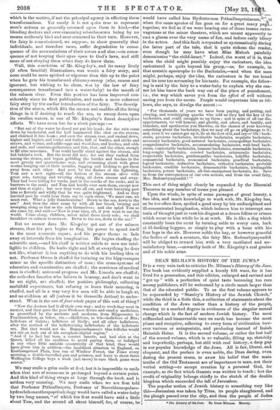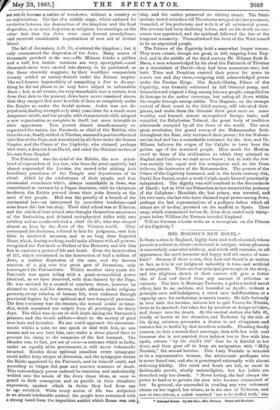DEAN MILMAN'S HISTORY OF THE JEWS.*
IT is a very vain task to criticize Dr. Milmau's History of the Jews. The book has evidently supplied a keenly felt want, for it has lived for a generation, and this edition, enlarged and revised and "got up " with a perfection of quiet taste becoming ,too rare among publishers, will be welcomed by a circle much larger than that of the educated public. To us the first volume appears to be superseded by "Stanley's History of the Jewish Church," while the third is a little thin, a collection of statements about the condition of the Jews rather than a history of the people, wanting to a marked degree in evidences of the singular mental change which is the fact of modern Jewish history. The most stiffneckecl and immoveable race on earth has become the most pliant and receptive, adhering to every form of civilization how- ever various or antagonistic, and producing instead of Isaiah Heinrich Heine. It is the second volume, or rather the last half of the second volume, which is so valuable, filling up, sketchily and imperfectly, perhaps, but still with real history, a deep gap in our popular knowledge of the Jews. All is fair, liberal, and eloquent, and the preface is even noble, the Dean daring, even during the present storm, to avow his belief that the main truths of the Old Testament are of importance to man, not their verbal setting—to accept creation by a personal God, for example, as the fact which Genesis was written to teach ; but the credit of originality belongs chiefly to the sketch of the double kingdom which succeeded the fall of Jerusalem.
The popular notion of Jewish history is something very like this—Jerusalem was taken by Titus, its people slaughtered, and the plough passed over the city, and then the people of Judea
• The Bistory of the Jews. By Dean Milman. Murray.
set out4 become a nation of wanderers, without a country or an o anization. The fact of a middle stage, which endured for cen uties between the destruction of the kingdom and the final dispersion, is as much forgotten at religious tea-meetings, as the other fact that the Jews were once fervent proselytisers, and received considerable importations of men not of Jewish blood.
The fall of Jerusalem, A.D., 70, shattered the kingdom ; but it only commenced the dispersion of the Jews. Many scores of thousands perished in the war,—Dr. Milman thinks a million and a half, but Jewish numbers are very apocryphal,—and thousands more were carried into slavery, to be purchased, as the Dean shrewdly suggests, by their wealthier compatriots already settled as money-dealers under the Roman sceptre. The well-known impossibility of compelling a Jew to do any- thing he did not please to do may have helped to enfranchise them ; but, at all events, the very remarkable fact is certain that from that date to the present, Jews have never remained slaves, that they escaped this most horrible of fates as completely under the Empire as under the feudal system. Judea was not de- populated, finding strength only sixty years later for a much more dangerous revolt, and her people, with characteristic skill, adopted a new organization as complete in itself, but more tolerable to their oppressors. Two powers almost simultaneously re- organized the nation, the Patriarch, or chief of the Rabbis, who from his seat, finally settled at Tiberias, assumed a position identical with that of the Pope, and was obeyed by all Jews under the Roman Empire, and the Prince of the Captivity, who claimed, perhaps with truth, a descent from David, and ruled the Oriental section of his race from Bagdad.
The Patriarch was the chief of the Rabbis, the new priest- hood of expounders of the law, who from the great captivity had almost superseded the Levites, the sacred tribe sinking into hereditary guardians of the Temple and depositories of its ritual. Aided by the misfortunes of their people, and that ceremonial conscience which, always remarkable in Jews, was exacerbated to rawness by a Pagan dominion, with its idolatrous incidents, the Rabbis pressed down their yoke fiercely on the neck of the people. Hell was the penalty of a breach of the ceremonial law—as interpreted by unwritten tradition—and none knew this law but they. Their chief school was at Tiberias, and the chiefs of that school, who thought themselves successors of the Sanhedrirn, and debated metaphysical trifles with rare subtlety and no result—elected a chief for life, who was obeyed almost as king by the Jews of the Western world. They reverenced his decisions, referred to him for judgment, sent him tithe in unstinted measure, and in no long time Imperial Rome, which, fearing nothing, could make alliance with all powers, recognized the Patriarch as Prefect of the Hebrews, and left him free to exercise a power of life and death. Even the insurrection of 117, which terminated in the destruction of half a million of Jews, a further dispersion of the race, and the famous erection of a pig over the great gate of Jerusalem, only interrupted the Patriarchate. Within another sixty years the Patriarch was again ruling with a quasi-monarchical power identical, as we have observed, with that claimed by the Pope. He was assisted by a council or conclave, whom, however he claimed to rule, and his decrees, which affected, under religions pretexts, every relation of human life, were enforced through provincial legates by four spiritual and two temporal processes. The first ceremony was the censure, the second niddui or inter- dict, which separated the culprit from all privileges for thirty days. The third was eherem or civil death during the Patriarch's pleasure, and the fourth sabbata—death to the society of good men here and hereafter. No one could approach the excommu- nicate within a toise, no one speak or deal with him, no one mourn and no one bury him, save under a stone placed there to prevent his rising to the summons of the last trumpet. The offender was, iti fact, put out of caste—a sentence which in India, under an equally alien government, is still never voluntarily incurred. Besides these spiritual penalties every synagogue could inflict forty stripes at discretion, and the synagogue meant the Rabbi appointed by the Patriarch, and he himself could, and according to Origen did, pass and execute sentence of death. This extraordinary power endured for centuries, and undoubtedly welded into the minds of the Jews those ideas, at once so grand in their conception and so puerile in their ritualistic expression, against which in Judea they had from age to age revolted. While every action of life was subjected to an almost intolerable control, the people were restrained with
ting, and the nation preserved its vitality intact. The Patri- archate lasted unbroken till Theodosius stripped the last possessor, Gamaliel, of his prefecture, and with it of all substantial power. His revenue had been declining before, and on his death no suc- cessor was appointed, and the spiritual followed the fate of the temporal monarchy. Thenceforward the Jews of the West ceased to be an organized people.
The Princes of the Captivity held a somewhat longer tenure.. They were extant, though not great, in 160, reigning from Bag- dad, and in the middle of the third century Dr. Mainers finds R. Hone, a man acknowledged by his rival the Patriarch of Tiberias as a descendant of David—they had been numerous once, but both Titus and Domitian exerted their power for years to search out and slay them,—reigning with acknowledged power under the Persian Kings. The Resch-Glutha, Prince of the Captivity, was formally enthroned in full Oriental pomp, and thenceforward reigned a king among his own people, compelled to do homage to the native sovereign, but ruling all Jews within the empire through satrap rabbis. The Magians, on the strange revival of their creed in the third century, still tolerated their guests, and under them the Oriental Jews grew more an more wealthy and learned, almost monopolized foreign trade, and compiled the Babylonian Talmud, the great body of tradition afterwards accepted by all the Jews of the world. The next great revolution, the grand sweep of the Mohammedan faith throughout the East, only increased their power ; for the Mahom- medan had and has a remarkable tolerance for the Jew, and Dr. Milman believes the reigns of the Caliphs to have been the- golden age of the scattered people. How much the Moslem owed to them of the civilization to which they attained in Bagdad and Cordova we shall never know ; but in both the Jew was socially the equal and the companion and, as the Dean believes, the instructor of the Mohammedan. The powers of the Prince of the Captivity increased, and in the tenth century, 934, David Ben Saccai, under a weak Caliph, made himself practically independent. The dignity was still confined to the descendants of David ; but in 1036 the Princedom at last incurred the jealousy of the Caliphate ; Hezekiah, the last prince, was arrested, and his two sons, the last who have claimed royal power among Jews, perhaps the last representatives of a pedigree before which all others are of to-day, perished on the scaffold in Spain. Their sway, which commenced before St. John died, ended only thirty- years before William the Norman invaded England.
Will no German scholar write us a monogram on the Princes. of the Captivity ?































 Previous page
Previous page